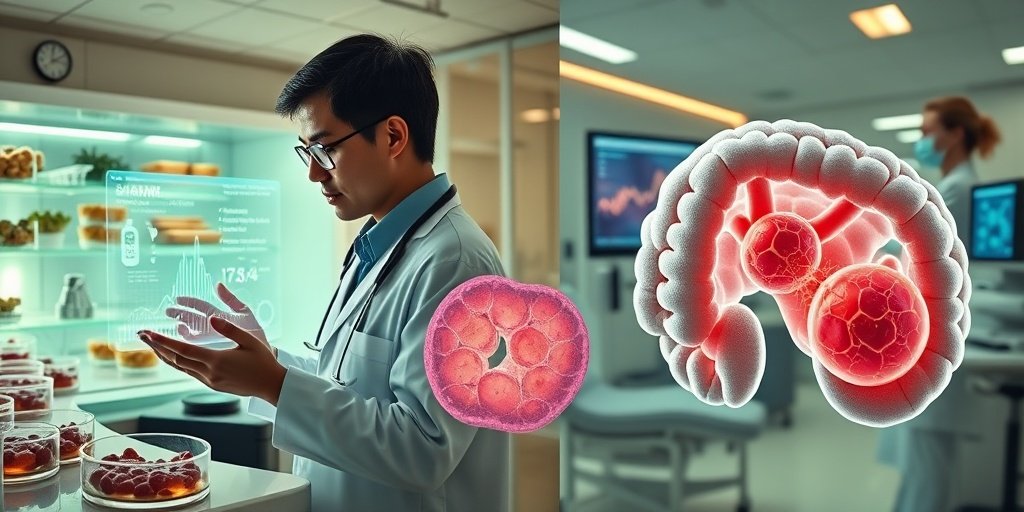⚡ Quick Summary
Recent advancements in understanding colorectal cancer (CRC) have led to significant breakthroughs in targeted therapies and immunotherapies. However, challenges such as tumor heterogeneity and drug resistance continue to impede treatment efficacy.
🔍 Key Details
- 📊 Focus: Colorectal cancer (CRC)
- 🔬 Technologies: Genomics, proteomics, bioinformatics, artificial intelligence (AI), organoid technology
- ⚙️ Challenges: Tumor heterogeneity, drug resistance, adverse effects of immunotherapies
- 🌱 Future Directions: Clarifying CRC pathogenesis, refining AI algorithms, improving organoid models
🔑 Key Takeaways
- 🌍 CRC is a leading cause of cancer-related deaths worldwide.
- 💡 Advances in molecular research have enhanced our understanding of CRC.
- 🤖 AI integration can predict disease risk and treatment responses.
- 🧬 Organoids mimic tumor characteristics for personalized treatment testing.
- ⚠️ Challenges remain in treatment efficacy due to tumor complexity.
- 🔄 Future research should focus on overcoming existing barriers in CRC treatment.

📚 Background
Colorectal cancer (CRC) is a significant global health concern, ranking among the top causes of cancer-related fatalities. The complexity of CRC is underscored by its molecular diversity, which has prompted extensive research into its underlying mechanisms. Recent advancements in genomics and bioinformatics have opened new avenues for targeted therapies, yet the journey toward effective treatment is fraught with challenges.
🗒️ Study
The study reviewed recent advances in CRC research, focusing on the integration of cutting-edge technologies such as artificial intelligence (AI) and organoid technology. These innovations aim to enhance our understanding of CRC and improve treatment outcomes. The authors emphasized the need for ongoing research to address the persistent challenges in CRC management.
📈 Results
The findings highlight the potential of AI to analyze genetic and clinical data, enabling predictions about disease risk and treatment responses. Additionally, organoids serve as valuable platforms for drug testing, closely replicating the genetic traits and biological behaviors of tumors. Despite these advancements, issues such as tumor heterogeneity and drug resistance remain significant hurdles.
🌍 Impact and Implications
The integration of AI and organoid technology in CRC research could revolutionize treatment strategies. By tailoring therapies to individual patients based on their unique tumor profiles, we can enhance treatment efficacy and minimize adverse effects. This approach not only holds promise for CRC but could also pave the way for advancements in other cancer types.
🔮 Conclusion
The study underscores the importance of continued research in CRC, particularly in refining AI algorithms and organoid models. As we strive to overcome the challenges posed by tumor heterogeneity and drug resistance, the future of CRC treatment looks promising. Collaborative efforts in molecular research and technology integration will be crucial in alleviating the global impact of CRC.
💬 Your comments
What are your thoughts on the integration of AI and organoid technology in colorectal cancer treatment? We would love to hear your insights! 💬 Leave your comments below or connect with us on social media:
Recent advances and challenges in colorectal cancer: From molecular research to treatment.
Abstract
Colorectal cancer (CRC) ranks among the top causes of cancer-related fatalities globally. Recent progress in genomics, proteomics, and bioinformatics has greatly improved our comprehension of the molecular underpinnings of CRC, paving the way for targeted therapies and immunotherapies. Nonetheless, obstacles such as tumor heterogeneity and drug resistance persist, hindering advancements in treatment efficacy. In this context, the integration of artificial intelligence (AI) and organoid technology presents promising new avenues. AI can analyze genetic and clinical data to forecast disease risk, prognosis, and treatment responses, thereby expediting drug development and tailoring treatment plans. Organoids replicate the genetic traits and biological behaviors of tumors, acting as platforms for drug testing and the formulation of personalized treatment approaches. Despite notable strides in CRC research and treatment – from genetic insights to therapeutic innovations – numerous challenges endure, including the intricate tumor microenvironment, tumor heterogeneity, adverse effects of immunotherapies, issues related to AI data quality and privacy, and the need for standardization in organoid culture. Future initiatives should concentrate on clarifying the pathogenesis of CRC, refining AI algorithms and organoid models, and creating more effective therapeutic strategies to alleviate the global impact of CRC.
Author: [‘Qi GX’, ‘Zhao RX’, ‘Gao C’, ‘Ma ZY’, ‘Wang S’, ‘Xu J’]
Journal: World J Gastroenterol
Citation: Qi GX, et al. Recent advances and challenges in colorectal cancer: From molecular research to treatment. Recent advances and challenges in colorectal cancer: From molecular research to treatment. 2025; 31:106964. doi: 10.3748/wjg.v31.i21.106964